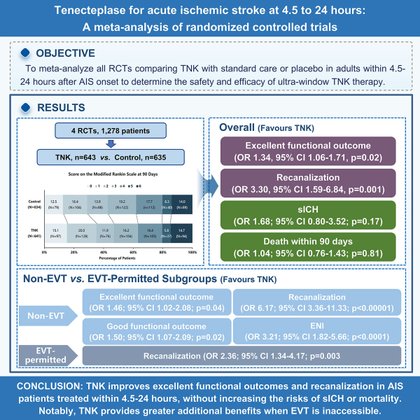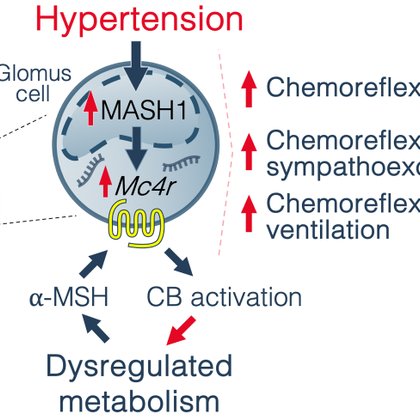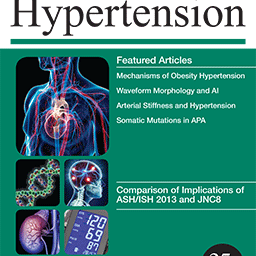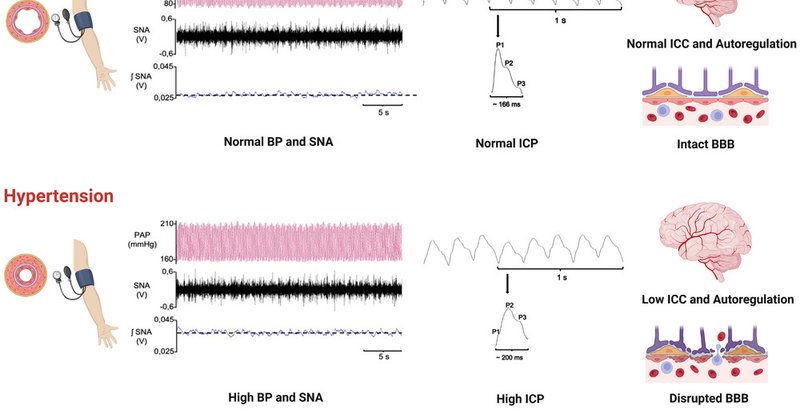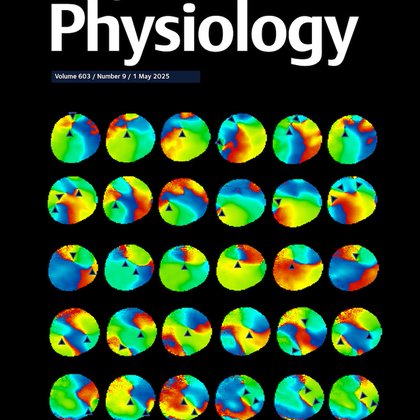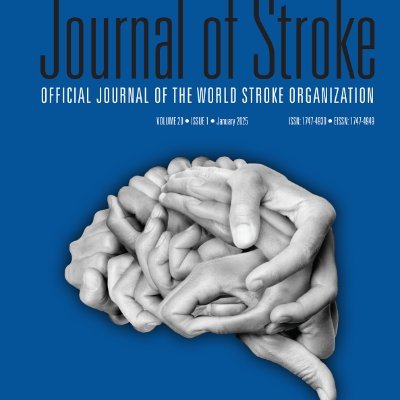
Fiona McBryde
@FionaMcbryde
Followers
143
Following
1K
Media
0
Statuses
131
Medical researcher at the University of Auckland, New Zealand
Auckland, New Zealand
Joined April 2020
Tenecteplase for Acute Ischemic Stroke at 4.5 to 24 Hours: A Meta-Analysis of Randomized Controlled Trials | Stroke
ahajournals.org
BACKGROUND: Whether TNK (tenecteplase) benefits patients with acute ischemic stroke treated within 4.5 to 24 hours remains uncertain, and no previous meta-analysis has differentiated between clinical...
0
24
95
Wonderful to see some of our FAOPS Council here in Frankfurt for the IUPS Conference! L-R: Prof Mangala Gunatilake who heads our Education & Leadership Mission, Treasurer Prof Linda Yu, Media & Sponsorship Mission lead Dr Fiona McBryde and Prof Yoshihiro. @TheIUPS @FionaMcbryde
0
1
2
@CircRes Sept 12th Issue is Out! https://t.co/IiX6g6rOKd Cover: image are the chemosensory GCs (cyan) scattered throughout a dense capillary network (grey) supplying the organ & innervated by numerous sensory NFs (orange) transmitting reflex information to the brain.
1
3
8
Thrilled to see our latest paper on the action of the melanocortin system in the carotid body published in @CircRes #hypertension #MC4R
https://t.co/A1A0V4IuFr Here's the breakdown of key findings 1/6🧵
ahajournals.org
BACKGROUND: The internal milieu of the body is controlled by a system of interoceptors coupled to motor outflows that drive compensatory adaptive responses. These include the arterial chemoreceptors,...
1
2
1
🚨New research reveals an overactive ‘fight-or-flight’ stress reflex may increase heart strain. This could help unlock ways to reduce heart attack and stroke risk. Congrats to 3 Heart Foundation-funded researchers and @AucklandUni on their research published in a top journal!
2
2
7
Dropping sympathetic is key to fully mitigate CV risk!
RESEARCH ARTICLE: Failure of Antihypertensive Treatment to Restore Normal Sympathetic Activity https://t.co/p7OxVY2yUg
0
0
0
Recently my image and was used in a deep fake video and promoted online to scam diabetes patients. This is a very important PSA.
1news.co.nz
Bogus footage of Q+A's Jack Tame and one of the country's leading diabetes researchers has been contrived to swindle people.
22
38
165
Hypertension, blood–brain barrier disruption and changes in intracranial pressure - Colombari - 2025 - The Journal of Physiology - Wiley Online Library
physoc.onlinelibrary.wiley.com
Abstract figure legend The schematic abstract illustrates how chronic hypertension disrupts neurovascular control, leading to abnormal intracranial pressure (ICP) regulation and blood–brain barrier...
1
2
5
Julian Paton, director of Manaaki Manawa, is leading attempts to develop a revolutionary new heart valve and improve the lives of children with rheumatic heart disease. https://t.co/XinbymI8Wf
nzherald.co.nz
Auckland scientists aim to develop a replacement heart valve that will grow with the child
0
1
2
The brain baroreflex – a hidden guardian of the cerebral circulation - Osei‐Boateng - The Journal of Physiology - Wiley Online Library
physoc.onlinelibrary.wiley.com
Click on the article title to read more.
0
2
2
The brain baroreflex – a hidden guardian of the cerebral circulation @JPhysiol
https://t.co/SDX2bbtgRb
physoc.onlinelibrary.wiley.com
Click on the article title to read more.
1
10
15
Congratulations to the FAOPS Travel Grant recipients at SAAP IX 🎉 Dr. Udari Kaushalya Egodage on Online Resources for Learning Physiology, Dr. Sonam Chaudhary on the Impact of Face Masks on Pulse Rate and Dr. Asfaq Rafed Rahman on Green Tea Effects on Paracetamol Liver Damage
0
1
2
Just Accepted! 💊Intensive blood pressure lowering for 24 hours after endovascular thrombectomy (EVT) may negatively impact outcomes, particularly in patients who received intravenous tissue plasminogen activator before EVT Read more below👇 https://t.co/lEPa7dYHQv
@jaeseob_yun
0
7
11
Michael J. Plunkett, Julian F. R. Paton and @DrJamesPFisher (@FMHS_UoA) examine our understanding of the autonomic control of pulmonary circulation, with an emphasis on its clinical relevance and potential therapeutic targeting in pulmonary hypertension! 📜 https://t.co/GfNFUpbjFO
0
8
22
New @japplphysiol Call for Papers « Cerebrovascular Control in Health and Disease: From Modeling to Translational Research » spearheaded by Ass. Editor @Pat_Brassard , and Guest Editors @CARickardsPhD and @brain_bfm (S. Payne). Send us your best work! https://t.co/phWsgIREsV
journals.physiology.org
The Journal of Applied Physiology publishes original papers that deal with diverse areas of research in applied physiology, especially those papers emphasizing adaptive and integrative mechanisms....
0
8
16
This makes me so grumpy that I’m unlocking my account. We have five days, so hit me up with your best thoughts on this and hopefully we can create a resource to make it easy for people to submit. Time to step up, fellow pakeha. Oh, and please retweet for reach.
Public submissions are now being called for the Local Government (Electoral Legislation and Māori Wards and Māori Constituencies) Amendment Bill. Make a submission by 11.59pm, Wednesday, 29 May: https://t.co/WPg4h7YD4r
33
229
316
Really excited to share findings from our first brain noradrenaline spillover study in humans! This work appears in @_JCBFM. A HUGE collaborative effort ! @RyanLeoHoilan @DrKurtosis @Sandy_REACHLab @Igor_Alex_1981 @DamianMBaileyEP @DrJMinhas @balkhaz
https://t.co/d86y2zOwgD
journals.sagepub.com
The impact of physiological stressors on cerebral sympathetic nervous activity (SNA) remains controversial. We hypothesized that cerebral noradrenaline (NA) spi...
2
12
37
I think it likely that some current anti-HT drugs already affect the venous circulation as well as arterial, it's just incredibly difficult to assess the hemodynamic effects on the veins: We don't know what we can't measure! (But now we can!)
0
0
0
That's an interesting question Michael. I think we can say with confidence that low venous capacity is bad, in a variety of scenarios. My take is that restoring capacity towards normal (eg in hypertension) is likely helpful short/medium term BP buffering. Longer term ...tbc!
1
0
0
Our latest publication - this was a massive technically demanding set of studies over three years, by the indefatigable Dr Tonja Emans. Epic!
The Forgotten Circulation: Reduced mesenteric venous capacitance in hypertensive rats is improved by decreasing sympathetic activity @FionaMcbryde
https://t.co/AVIWIr0XbP
2
4
14


